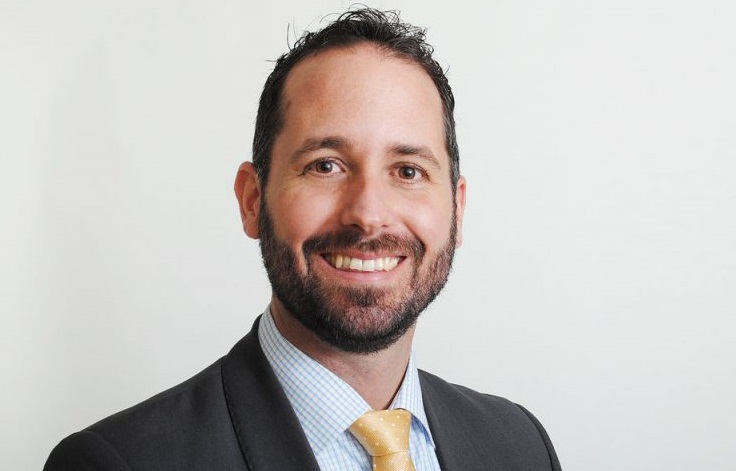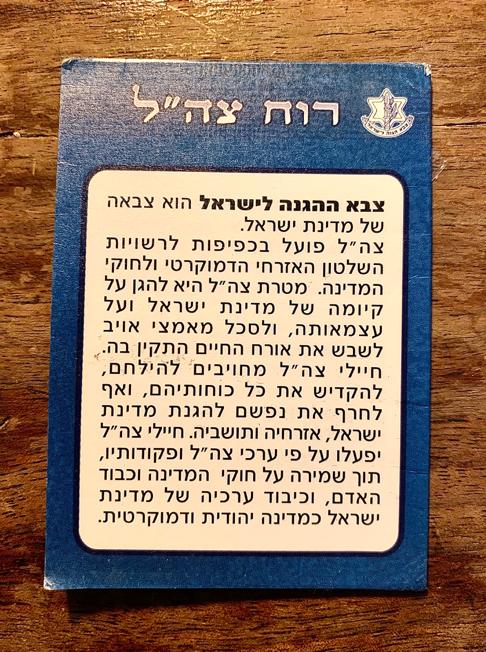.
By Jon Sutz, Editor, SaveTheWest
PREFACE
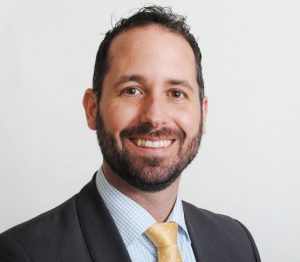
Doron Keidar is the founder and Executive Director of CryForZion, a nonprofit that it describes as “a movement of Jews and Christians who support the Jewish people’s rights to sovereignty over Mt. Zion, and their rights and freedoms on their most holy place.” After years of active-duty service in the IDF, during which he rose to the rank of Master Sergeant, Doron is now a reservist in a special forces unit, and also works as a security consultant.
I first met Doron in 2011, through a speech he gave in a Virginia church. A friend, who knew of my blogging in defense of Israeli soldiers, against the widespread incitement and bias against them by the mainstream Western news media, told me that a former IDF soldier would be speaking at a nearby church, about the situation there, and to raise money for a prototype military vest he was creating, to help better defend Israel’s warriors. As this would be the first chance I’d had to that point to hear an IDF soldier speak, in person, I jumped at the chance. The event was attended by about 100-120 people.
Then, a funny thing happened; mid-way through Doron’s speech, I put my hand in the air, to ask a question. I am normally a very reserved, polite person, and would never imagine myself interrupting a speech, especially by a former IDF soldier. Perplexed, Doron courteously explained to me that it wasn’t time for Q&A yet, but if I had something brief to ask, he’d respond.
I said something along the lines of:
“I’m sorry to interrupt, but what you just said is something that really struck me, as a pro-IDF blogger, trying to defend your brothers and sisters in arms against the endless vicious lies by the media. You just described how, when IDF soldiers are going through basic training, and are given their weapons for the first time, they’re also given a document that says the weapon is only to be used for defensive purposes – never offensive. Why is that simple fact not widely promoted by the IDF, and the Israeli government? Even as an avid researcher and blogger, I’ve never heard of that. And it would be extremely helpful in terms of articulating the difference between the IDF and the moral basis on which it exists, versus the terrorists against whom its soldiers are regularly forced to defend Israel.”
Doron and I stood there looking at each other, for perhaps five or so seconds, across a small sea of people. I recall that he then said something along the lines of:
“It’s a really good question. I don’t have an answer.”
I again apologized for interrupting his speech. We spoke after his speech, and I explained more about my research and blogging in defense of Israel and the IDF. Over the following years, particularly after Doron saw my 2016 documentary on HuffPost’s incitement and bias against Israel, he and I become good friends.
Now, as Hezbollah and Iran are again threatening to wipe Israel off the face of the Earth, Hamas and Palestinian Islamic Jihad are firing rockets at Israeli civilians, and Judea-Samaria (“the West Bank”) is becoming less stable, it seemed like a good time to do this interview with Doron, and chronicle, in detail, what he said about IDF soldier training, that so struck me, when we first met.
This interview was conducted by email in March 2020; the copy has been edited only for clarity.
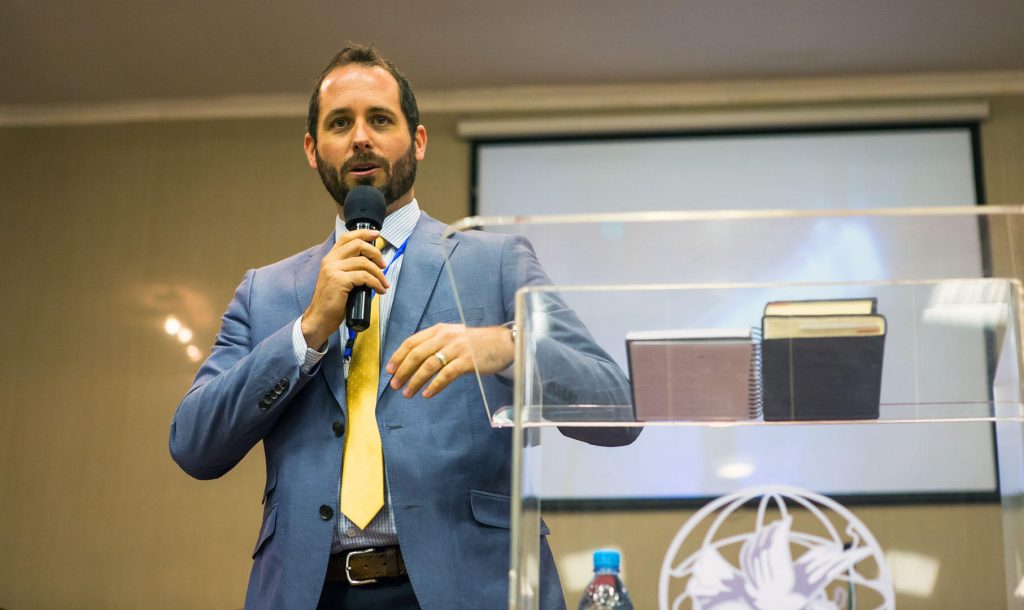
THE INTERVIEW
(1) Doron, thank you for doing this interview with SaveTheWest.com. What can you share about your personal and professional background, and in particular, where (geographically) you served in the IDF?
I work as an executive protection security agent for Bar Homes Security in Jerusalem and have been working in the personal protection industry for over 14 years. I have been working on Israeli diplomacy for the past 9 years, by traveling and speaking on Israel all over the globe.
Regarding my military service, I served in the IDF Givati combat unit in 2003 in Gaza, Hebron and Shechem. In 2006, I served in the northern command, along the Lebanese/Syrian border, in a reserve unit, and have served in all major conflicts since then. Today, I serve in a special forces unit of the IDF reserves. Because of my rich military experience, and having served in multiple areas as a commander in the IDF, I have a more unique perspective of the Israeli military than most Israelis who have served.
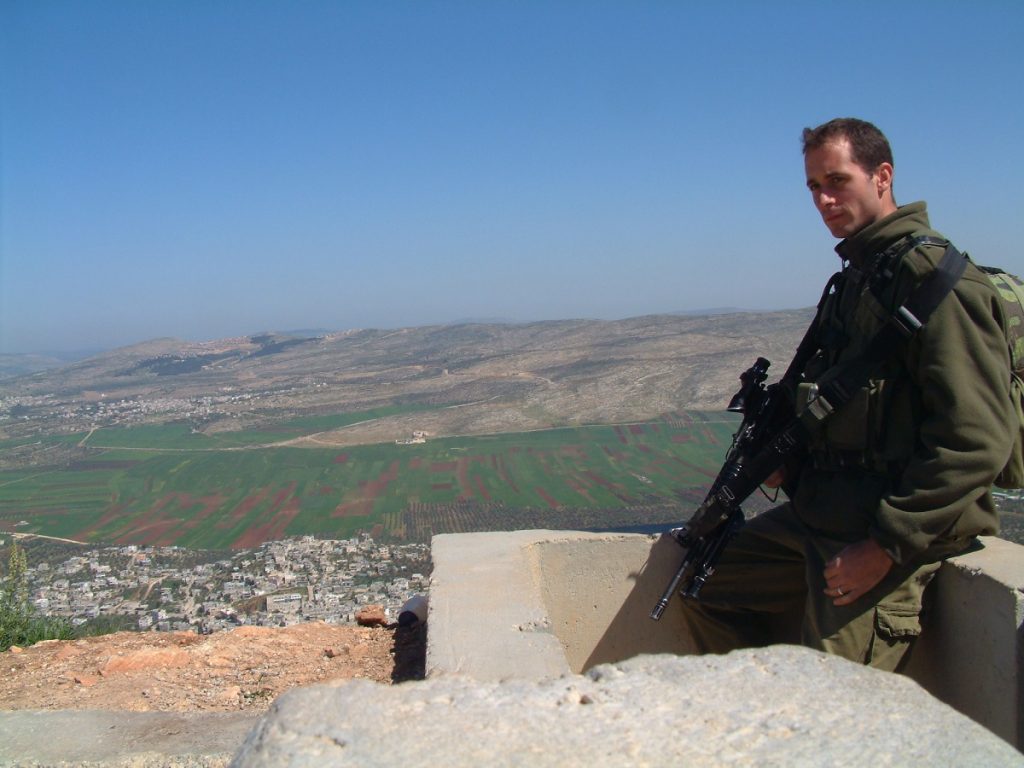
(2) Revisiting our first encounter, when I interrupted your speech, can you clarify what you said?
Yes, we have what are called “purity of arms” (טוהר הנשק) instructions, which we receive when we are first issued our weapons. They are basic principles about when and how we can use our weapons. It is the ethical code that clarifies that our weapon is the last option and mainly for defense. It states:
“The soldier shall make use of his weaponry and power only for the fulfillment of the mission and solely to the extent required; he will maintain his humanity even in combat. The soldier shall not employ his weaponry and power in order to harm non-combatants or prisoners of war, and shall do all he can to avoid harming their lives, body, honor and property.”
The “purity of arms” doctrine is actually part of a larger articulation of principles and values that guide all IDF personnel, from the bottom to the top, called the “Spirit Of The IDF” (Hebrew; English) which is defined as:
“The ‘IDF Spirit’ is the IDF’s corporate identity card, which should underpin each and every soldier’s operations within the IDF, regular service and reserve service. The ‘IDF Spirit’ and its rules of action are the IDF’s code of ethics. The ‘IDF Spirit’ will be used by the IDF, its soldiers, commanders, units and corps in designing their operating patterns. According to the ‘IDF Spirit,’ they will conduct, educate and criticize themselves and others.”
The “Spirit Of The IDF” also states that it is derived from four sources:
- The IDF tradition and its fighting heritage as the Israeli Defense Forces.
- The tradition of the State of Israel on its democratic principles, laws and institutions.
- The tradition of the Jewish people throughout the ages.
- Universal moral values that are based on human dignity and his honor.
This is the card I carry with me every day, which contains the basics of the “Spirit Of The IDF”:
This ethical code was originally used even before the state of Israel or IDF was founded in the 1940’s. This is something that I have not heard of in other militaries.
Also, our military takes extreme risks with our soldiers to prevent harming innocent civilians, as decided by a rabbinical perspective of war ethics, which is extremely unique as well. In fact, this point was made clear to us on visiting Jerusalem, as all the young recruits from my brigade were gathered together, to listen to the Chief Rabbi of the IDF explain to us the military ethics that many of us might not agree with, especially the atheists in our units. He explained how the IDF has chosen to rely on Rabbinic guidance on how to fight war ethically, as a Jewish state. That would mean endangering our own lives in battle, even to prevent civilian casualties from our enemies. He explained that when looking at how the U.S. military conducted similar missions, we would endanger our soldiers in ways they wouldn’t, in order to prevent civilian casualties from our enemies, we statistically had way less casualties for our troops. The rabbi continued to explain that when given the option of firing a smart bomb from one of our fighter jets at a terrorist target, and risking “collateral damage” — innocent people being hurt — or sending in our foot soldiers, and endangering these soldiers’ lives to the enemy, we would rather choose the later.
All of this makes the IDF one of the most moral militaries in the world, and I believe is what gives us such a supernatural success on the battlefield — not because we are tactically or militarily better than others. This is also evident in the naming of our military IDF (Israel defense force) emphasis on “defense.”
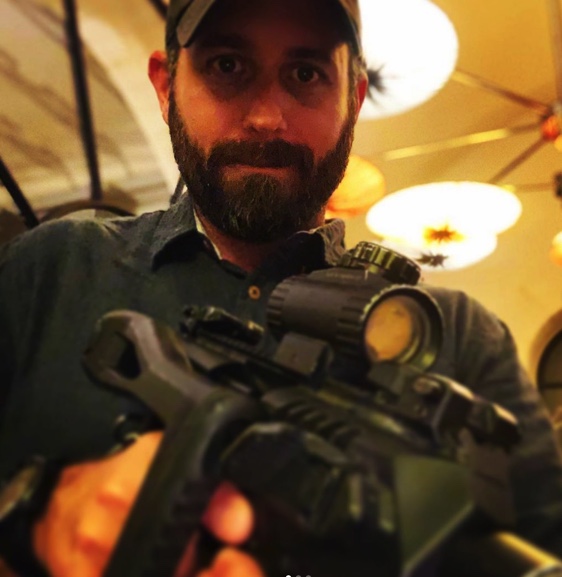
Editor: Learn more about the IDF, the “Spirit of the IDF” document, and Israel’s overall defensive strategy at:
Ruach Tzahal – IDF Code of Ethics
The Spirit of the IDF by Tzvi Hauser
(3) While I still think this should be a heavily promoted fact by the IDF and the Israeli government, it seems particularly relevant at this moment in history, as Israel appears to be getting nearer to being forced into a war unlike any before. Do you agree?
Absolutely. Unfortunately, our foreign ministry and other parts of the government have not thought to make this simple point clear on an international platform, probably because we are not good at stating the obvious, many time.
We take for granted what makes us unique, because we are trying to constantly receive the acceptance and approval of the nations, instead of being proud of who we uniquely are. So, yes, I believe that we can do better at Israel diplomacy, which is why I have stepped up to the plate, like many others who have noticed the same problems we have — of being proud of who we are, and making public the reasons why.
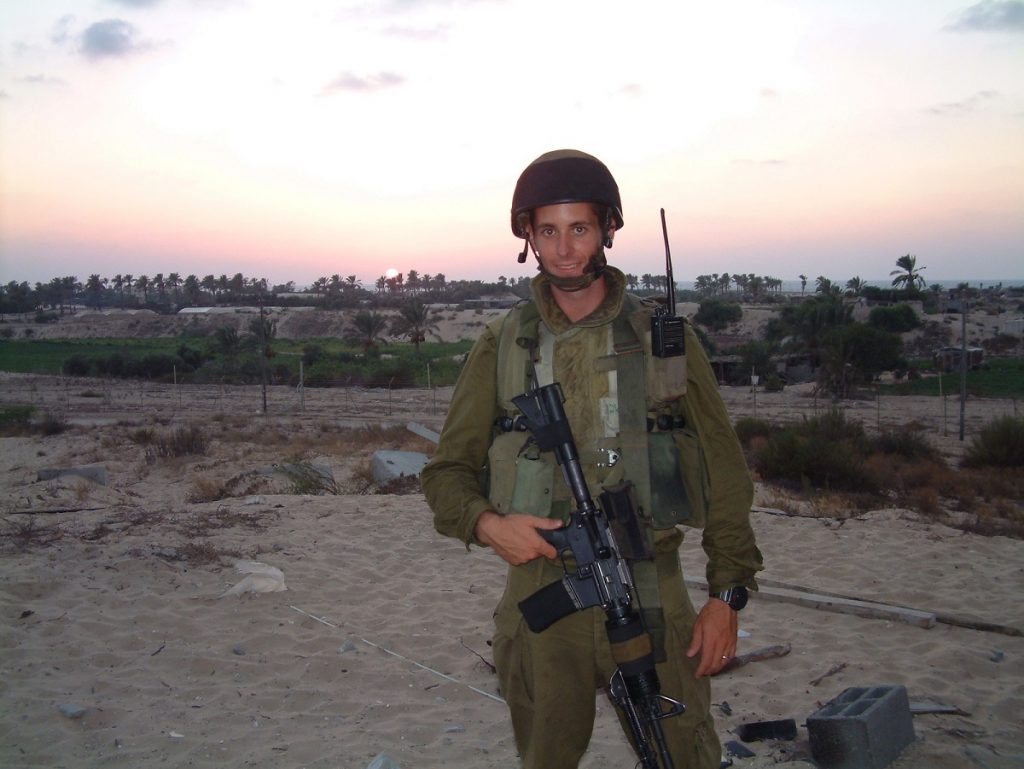
(4) If you had a global platform on which you could speak to the general population, all at once, and you could correct three popularly-accepted misconceptions about the IDF, what would you say?
I will answer this from my personal journey in the IDF, and my fist-hand experience during my past and present service.
The three main false accusations that I typically read or hear about Israel are:
(1) That Israel is an apartheid state
(2) That Israel stole the Palestinians’ land
(3) That Israel kill innocent Palestinians
Let’s start with (1): Is Israel an apartheid state? According to the Central Bureau of Statistics, as of December 31, 2019, Israel’s population consists of 9.1 million citizens. Of them, 74.1% (about 6.7 million) are Jewish, 21.0% (about 1.9 million) are Arab, broken down about 80% Muslim and 20% Christian Arabs, and 4.9% (about 400,000) other. Of such a small minority of the Israeli population being Arab, they hold supreme court positions, work as doctors, lawyers, actors and other roles in the performing arts, ministers in Israel’s parliament, they serve in the IDF, our police forces, and more. How is Israel an apartheid state if Arabs share equal rights like every other citizen? In fact, Arabs are not obligated to serve in the IDF, while other Israelis, Jewish and Druze, are obligated. An Arab in Israel can, in fact, abuse the system in their favor and many do. As a Jewish Israeli citizen, I have more obligations than they do!
Another important point is the Druze minority population of Israel. Since Israel’s rebirth in 1948, the Druze minority who were chased from, and often persecuted by the Muslim Arab community, have had equal opportunity, and are some of Israel’s top citizens. So, in actuality the only place where apartheid exist is in the Palestinian Authority, where Israeli citizens are forbidden from entering, by risk of death, and the Christian population is persecuted. These are facts.
Also, if there is anyone practicing apartheid, it is the Palestinians, and here is my proof — the entrance to “Area A,” which is ruled by the PA:
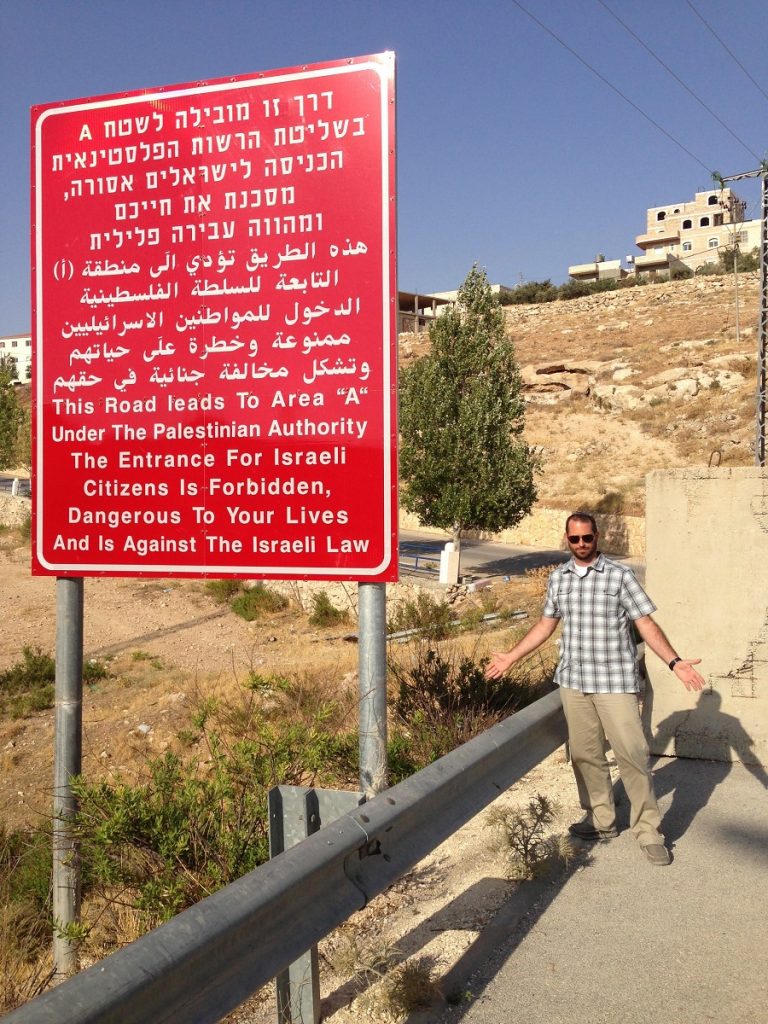
Regarding accusation (2): Did Israel steal the Palestinians’ land? To answer that question, let’s start by asking: “Were the Palestinians ruling Palestine before 1948?” The answer is no. Also, we should ask, “Who was the first Palestinian king or ruler of Palestine, or a capital city?” You will find that there are no answers to these questions, since Palestine, as a people or civilization, never existed.
So we must ask, “Who ruled Palestine before 1948?” The answer is, the British ruled the general territory known as Palestine from 1917 to 1948. Palestine was absorbed into the Ottoman Empire in 1517, and remained under the rule of the Turks until World War One. Towards the end of this war, the Turks were defeated by the British forces, led by General Allenby. In the peace talks that followed the end of the war, parts of the Ottoman Empire were handed over to the French to control, and other parts were handed over to the British – including Palestine. Britain governed this area, under a League of Nations mandate, from 1920 to 1948, which was agreed upon at the San Remo conference in Italy, as an extension of the Paris Peace Conference of 1919-1920. Ironically, the areas of Zor and Transjordan were the ones that remained unclear — not the Jewish peoples’ right to return to Palestine.
The reality is that Jews have lived on the land of Israel for 3,800 years, and were formally ruled by a king as of 3,000 years ago.
So who ruled Palestine before the Ottoman Empire? During the Early Islamic, Crusader and Late Islamic Periods, between 638-1516 CE, the Christians and Muslims ruled the area. Before then, the Byzantine Roman Empire ruled, from 324-638 CE. (It was only in year 638 CE – the beginning of the Early Islamic Period – that Jews were permitted to return to Jerusalem, after having been banned from the city for 568, years under Roman/Byzantine rule.) Prior to this point, the Land of Israel was ruled by the Jewish people. This land was called “Israel/Judea” right up until the Romans conquered the area, in 63 BCE.
So where does Palestine come from? Palestine is what the Romans began calling the land of Israel in 135 AD, when emperor Hadrian changed the name of the province from Iudaea (Judea) to “Palestine,” in order to complete the dissociation between the Jewish rebels and the region. Jerusalem was also renamed to “Colonia Aelia Capitolina,” to erase Jewish history to the capital where both Temples stood, and from which the Jewish kings ruled. Palestine is a play on words, from “Philistines,” in the Bible, which is a Hebrew word meaning “invaders.” The Philistines were Greeks, who were known as the “Phoenicians,” who invaded Israel’s coastland, including Lebanon, and parts of what are now western Syria. The Gaza Strip of today was given a Hebrew name, meaning “invaders” (פלשתים).
So who are the modern day “Palestinians”? They are Arabs, who come from all over the region surrounding Israel, including some who have lived in the land up until the British mandate of Palestine. In fact, if you ask a “Palestinian” about his or her family name, I can tell you from what part of the Middle East they originate. Sadly, the Christian Arabs who have lived in the land of Israel as far back as the Roman/Byzantine period are the ones who have a stronger indigenous claim to Israel than the Muslim Arabs, and have been slowly dropping in numbers because of the Muslim Arabs who have overrun their cities, including Nazareth and Bethlehem. About twenty years ago, 80% of Nazareth and Bethlehem were Christian Arab; today they are 80% Muslim Arab. Today, the issue of sovereignty and self-determination for the Arabs and Israelis is not fully solved, for sure, and I believe both have rightful claims to the region, but let’s at least start by recognizing that the “Palestinians” were not in the region before the Jews, who have thousands of years here, in contrast of no more than 1,700 years for the Muslim Arabs. Also, using the anti-Semitic term of “Palestine” to make a claim to the land of Israel is absurd. In fact, the first time the Arabs living in Israel used the term “Palestinian” was as a propaganda term against Israel, during the founding of the terrorist organization the Palestinian Liberation Organization (PLO) in 1964, three years before the 1967 Six-Day War, and popularized by Yasser Arafat from 1969-2004.
Ironically, during the British Mandate of Palestine, it was the Arabs who rejected being called “Palestinian.” The Jews adopted the term, hence originally the “The Jerusalem Post” was called “The Palestine Post” in 1932. The Jerusalem Symphony Orchestra was founded as the “Palestine Broadcasting Service Orchestra” in the late 1930, by the Jewish community. Lastly, having terrorists (according to the PLO charter) being the ones to negotiate on the Muslim Arabs’ behalf is more than insulting and will lead nowhere.
Finally, in regards to (3): Does Israel kill innocent Palestinians? As you can see earlier in the article I provided above, the IDF’s code of conduct explicitly employs every measure imaginable to prevent this from occurring. So how can it be that with such a moral code, Palestinians are being killed?
The answer is that the numbers are inflated, and the reporting from the Palestinian Authority is false. They claim, “Israel killed innocent Palestinians!” when, in fact, they were the ones to put their citizens in harm’s way. It’s a classic tactic, when you know that you can’t defeat your enemy through conventional means, you resort to lies and propaganda. Many times, since the Palestinian terrorists know that Israel’s military is an ethical one, they will gather civilians into weapons storage areas, rocket launching pads, or use mosques, schools and hospitals as headquarters, to either divert an Israeli military strike, or in the hope that we not detect that civilians are present. In the process of responding to enemy fire, the IDF unintentionally causes civilian casualties, which are used by the Palestinians to accuse Israel of murder.
These are cruel psychological warfare tactics, since they not only affect Israel’s image in the eyes of the Palestinians, and the world’s opinion, but they also effect Israeli soldiers, who feel like they might have accidentally killed an innocent bystander. This, in turn, affects Israelis in our society and politics, giving legitimacy to the false narrative that Israel is an occupier, military state, aggressor and so on. No Israeli wants to identify with, or support such notions.
So, no, Israel does not kill innocent Palestinians; our soldiers target terrorists, like any other democracy in the world should do, and does. This short video, produced by the Jerusalem Institute of Justice, helps to debunk all of these myths about the Israel-Palestinian conflict:
Unfortunately, most of these misconceptions have been criminally promoted by “fake news” reporting, and anti-Semitic world leaders, who want to choose a side in this conflict, when instead of letting both the Israelis and Palestinians solve their own problems. Both governments and media outlets have too much to lose from war financing and “fake news” reporting if that were the case, so they each criminally contribute to the perpetuity of the conflict, instead of supporting a resolution. I hope that one day, both Israelis and “Palestinian” Muslim Arabs would seek to resolve our issues internally, and boycott foreign involvement, and ignore what the news outlets reporting. We would accomplish a lot, if that were the case, in my opinion.
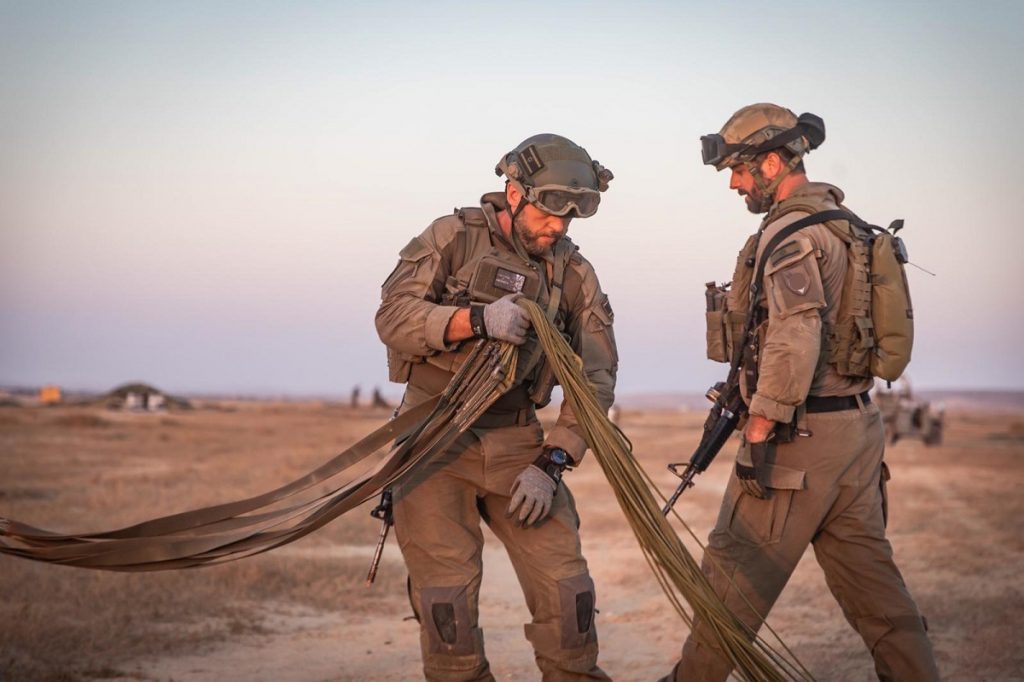
Of all the nonprofits in the West that advocate for the IDF and Israel, which do you view as the most effective, and deserving of our financial and moral support?
Unfortunately, you have very few good nonprofits in the West that advocate specifically for the IDF, and Israel in general. One that I can recommend is StandWithUs, which is doing a good job on Israel advocacy. SaveTheWest gives good and accurate reporting on Israel.
You can also follow individuals including Barry Shaw (who does great work at the Israel Institute for Strategic Studies), Rudy Rochman, Mohammad Kabiya, Hananya Naftali, Yahya Mahamid and many others who tell their personal stories as Jewish, Christian and yes Muslim Zionists.
If our readers are interested in learning more about, or reaching out to you, how would they do so?
Yes, they can follow me on Facebook, Instagram, and YouTube, where I’m the most active. Also, they are welcome to check out my nonprofit website CryForZion, where I fight for Jewish sovereignty and religious freedom on the Temple Mount in Jerusalem.
.
.
.

